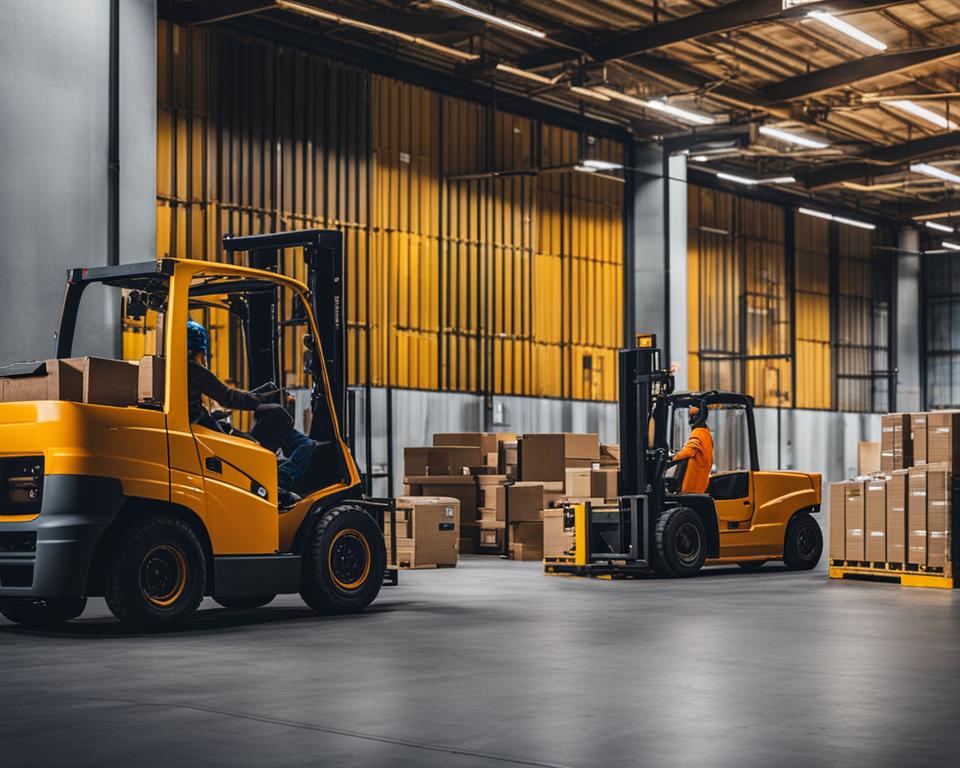Did you know that there are currently over 4000 logistics job openings across the United States? This staggering statistic highlights the immense opportunities available in the logistics industry. Whether you’re looking for entry-level positions or senior roles, the logistics job market offers a diverse range of opportunities for individuals at all stages of their careers.
From warehousing and transportation to supply chain management and procurement, the logistics industry encompasses various sectors and positions. It plays a vital role in ensuring the smooth flow of goods and services, making it a crucial part of the economy.
Whether you’re a recent graduate, a seasoned professional looking for a career change, or someone interested in exploring new opportunities, the logistics industry presents an exciting path to pursue. With such a high number of logistics job openings, you’re bound to find a position that aligns with your skills, interests, and career goals.
To help you navigate the logistics job market and make the most of these opportunities, this article will provide insights into the different roles available, the emerging careers in logistics, salary trends, and tips for securing a logistics position. So, let’s dive in and explore the world of logistics careers!
Navigating the US Logistics Job Market
The US logistics job market offers a plethora of opportunities for job seekers, with a wide range of positions available in various sectors of the industry. Understanding and navigating this dynamic market is essential for individuals looking to embark on a career in logistics. Whether you are just starting out or looking to advance your career, taking the time to explore the different roles and possibilities can lead to a successful and fulfilling professional journey.
Railcar/Truck Loader to Team Leader/Foreman
On the entry-level end of the spectrum, railcar loaders and truck loaders play an integral role in the logistics process. These positions involve loading and unloading goods onto railcars or trucks, ensuring proper handling and secure transport. With experience and expertise, individuals in these roles can progress to more leadership-oriented positions such as team leaders or foremen. Transitioning into these roles involves overseeing a team, managing operations, and ensuring smooth logistical processes.
Emerging Careers: Sustainability Technician and Logistics Specialist
The logistics industry is continuously evolving, and alongside this evolution comes the emergence of new and exciting career opportunities. Two emerging careers in the field of logistics are sustainability technicians and logistics specialists.
Sustainability technicians focus on implementing environmentally-friendly practices within the logistics industry. They work towards reducing carbon footprints, optimizing energy consumption, implementing recycling programs, and promoting sustainable transportation options. As sustainability becomes an increasingly important aspect of businesses worldwide, the demand for these professionals is growing.
Logistics specialists, on the other hand, are responsible for the efficient and effective management of complex supply chain operations. They oversee the movement of goods, analyze and optimize logistics processes, and collaborate with various stakeholders to ensure seamless operations. With their expertise in operations management and supply chain optimization, logistics specialists play a crucial role in enhancing efficiency and cost-effectiveness within the logistics industry.

| Position | Description |
|---|---|
| Railcar Loader | Responsible for loading and unloading goods onto railcars, ensuring proper handling and secure transport |
| Truck Loader | Responsible for loading and unloading goods onto trucks, ensuring proper handling and secure transport |
| Team Leader | Oversees a team of logistics personnel, manages operations, and ensures smooth logistical processes |
| Foreman | Supervises and coordinates the activities of logistics workers, ensuring efficient and effective operations |
| Sustainability Technician | Implements environmentally-friendly practices within the logistics industry, focuses on reducing carbon footprints and optimizing sustainability initiatives |
| Logistics Specialist | Oversees complex supply chain operations, analyzes and optimizes logistics processes, collaborates with various stakeholders to ensure seamless operations |
Diverse Opportunities: Exploring Various Logistics Roles
The logistics industry offers a wide range of opportunities for professionals looking to build successful careers. Whether you prefer remote work or being based at a physical location, there are diverse logistics roles to suit your skills and preferences. Let’s explore two prominent categories of logistics positions: remote logistics roles and on-site positions at key logistics hubs and hotspots.
Remote Logistics Roles: A Thriving Sector
In recent years, remote logistics jobs have gained significant popularity, especially with the rise of technology and increased connectivity. These positions provide individuals with the flexibility to work from the comfort of their own homes or any location with an internet connection. Remote logistics roles span various functions, including supply chain management, transportation coordination, inventory control, and customer service, among others.
Working remotely in the logistics industry offers several advantages. It allows professionals to achieve a better work-life balance and eliminates the need for a daily commute, saving time and money. Additionally, remote work provides opportunities for professionals to tap into the global job market, as geographical barriers become less restrictive.
Some common examples of remote logistics positions include:
- Remote Logistics Coordinator
- Work-from-Home Supply Chain Analyst
- Virtual Transportation Manager
- Remote Inventory Control Specialist
These remote job opportunities in logistics enable individuals to leverage their skills and expertise while enjoying the flexibility and convenience of working from home.
On-site Positions: Key Logistics Hubs and Hotspots
While remote logistics roles provide flexibility and convenience, many professionals thrive in on-site positions, where they can actively contribute to the fast-paced logistics industry. Key logistics hubs and hotspots across the United States offer numerous opportunities for individuals who prefer working in a physical location.
Logistics hubs are strategic locations with extensive transportation infrastructure, making them ideal for efficient movement of goods and materials. These hubs often house logistics companies, distribution centers, and warehouses, creating a significant demand for skilled professionals.
Some of the key locations for logistics employment in the United States include:
| Logistics Hub | State |
|---|---|
| Los Angeles | California |
| Chicago | Illinois |
| Atlanta | Georgia |
| Houston | Texas |
| New York/New Jersey | New York/New Jersey |
| Miami | Florida |
These locations are known for their bustling logistics industry and offer a wide range of on-site jobs, such as warehouse supervisors, logistics managers, transportation coordinators, and operations analysts, among others. Professionals working at logistics hubs have the opportunity to collaborate with industry experts, gain valuable experience, and contribute to the efficient movement of goods within the supply chain.
By exploring various logistics roles, you can discover exciting career opportunities and find the right fit for your skills and preferences. Whether you choose a remote position or an on-site role at a logistics hub, the logistics industry offers diverse options for professionals looking to make their mark in this dynamic field.
Salary Trends and Career Advancement in Logistics
When considering a career in the logistics industry, it is important to take into account the salary trends and opportunities for career advancement. While salaries may vary depending on factors such as location, experience, and job position, logistics professionals can expect competitive compensation packages. The logistics industry offers a wide range of roles, from entry-level positions to senior management, providing individuals with the potential for career growth and advancement.
Logistics professionals with knowledge and expertise in areas such as supply chain management, transportation, and inventory control have the opportunity to command higher salaries. As their skills and experience increase, they become valuable assets to companies in the industry and can negotiate better compensation packages.
In addition to competitive salaries, the logistics industry offers ample opportunities for career advancement. As professionals gain experience and demonstrate their capabilities, they can progress to more challenging roles with increased responsibilities and leadership opportunities. This enables individuals to broaden their skill sets, expand their knowledge, and take on new and exciting challenges.
Career advancement in logistics is not limited to traditional hierarchical progression. Professionals can also explore lateral moves to gain exposure to different aspects of the industry or specialize in specific areas. For example, someone with a background in transportation management can transition into procurement or warehouse operations. This versatility allows individuals to continuously develop and enhance their skills, paving the way for long-term career growth.
By staying informed about the latest industry trends, networking with professionals, and investing in professional development opportunities, individuals can position themselves for success in the logistics industry. It is an industry that rewards hard work, dedication, and innovation, offering a fulfilling and prosperous career path for those who are passionate about logistics.

Conclusion
As the logistics industry continues to experience rapid growth and evolution, it is essential for individuals interested in pursuing a career in this field to adequately prepare themselves for the upcoming employment boom. By taking proactive steps and following key tips, job seekers can enhance their chances of securing a rewarding logistics position in today’s competitive market.
Preparing for the Logistics Employment Boom
In order to prepare for the logistics employment boom, it is crucial for aspiring professionals to stay updated on industry trends and advancements. By keeping a finger on the pulse of the logistics industry, individuals can showcase their knowledge and adaptability to potential employers, making themselves attractive candidates for the numerous job opportunities that will arise.
Acquiring relevant skills and certifications is another vital aspect of preparing for the logistics boom. By investing in specialized training and education programs, individuals can demonstrate their expertise and commitment to the field. This not only increases their marketability but also equips them with the necessary tools to succeed in a dynamic and competitive industry.
Key Tips for Securing a Logistics Position in Today’s Market
In today’s competitive job market, securing a logistics position requires a strategic approach. Job seekers should optimize their resumes and cover letters to highlight their relevant experience, skills, and achievements. Tailoring these documents to align with the specific requirements of logistics roles can significantly increase the chances of being shortlisted for an interview.
Preparing for interviews is equally important. Researching the company, understanding the role, and anticipating common interview questions can help applicants impress potential employers with their industry knowledge and enthusiasm. Additionally, showcasing strong communication and problem-solving skills during interviews can give candidates an edge over their competition.
Lastly, leveraging online job platforms and networking with professionals in the logistics sector can expand job seekers’ opportunities. By actively engaging in online communities and attending industry events, individuals can build valuable connections, gain insights into the job market, and potentially secure referrals or recommendations that can enhance their chances of landing a logistics position.

